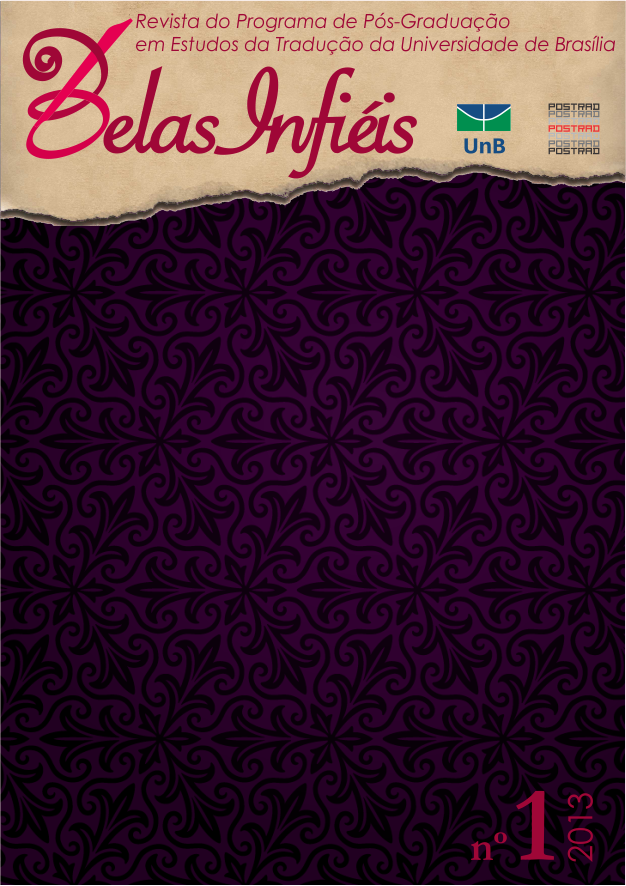NOTRE-DAME DE PARIS:
TERMINOLOGIA ESPECÍFICA EM TEXTO LITERÁRIO?
DOI :
https://doi.org/10.26512/belasinfieis.v2.n1.2013.11218Mots-clés :
hibridação, texto hugoano, terminologia, monstruação, Notre-Dame de ParisRésumé
O presente artigo visa discutir a presença da terminologia específica no texto literário. Para tal finalidade, primeiramente, faz-se um panorama da terminologia e seu objeto de estudo; depois, analisa-se o texto hugoano no que concerne à hibridação discursiva e autoral; e, por fim, discute-se as terminologias presentes no capítulo “Gringoire tem várias boas ideias consecutivas na rua dos Bernardinos”, do romance Notre-Dame de Paris, de Victor Hugo. Todas essas etapas se destinam a mostrar o processo de monstruação experimentado pelo tradutor por meio da terminologia específica em texto literário.
Téléchargements
Références
ARTIZ, Reiner; PICHT, Heribert. Introducción a la terminología.Traducción del alemán, Amelia de Irazazábal. Madrid: Fundación Germán Ruipérez, 1995.
BAGNO, M.Norma linguística, hibridismo e tradução. Traduzires, v. 1, n.1, p. 19-32,Brasília, 2012. Disponível em: <http://seer.bce.unb.br/index.php/traduzires/article/view/6652/5368>. Acesso em: 10 out. 2012.
CASTELLO, J. D.A literatura brasileira: origem e unidades (1500-1960). São Paulo: Edusp, 2004.
CHARMARAT-MALANDAIN, G. Langue, parole et savoir dans Quatrevingt-treize. In: NAUGRETTE, Florence. Victor Hugo et la langue: Actes du Colloque de Cerisy, 2-12 août 2002.Paris: Bréal, 2005.
DIAS, Cláudia A. Terminologia: conceitos e aplicações.Disponível em: <http://www.scielo.br/pdf/ci/v29n1/v29n1a9.pdf>. Acesso em: 03 out. 2012.
HUGO, Victor. Notre-Dame de Paris. Paris: Flammarion, 2009.
____________. L’Homme que rit.Paris: LGF, 2002.
____________. Le dernier jour d’un condamné précédé de Bug-Jargal. Paris: Gallimard, 1970.
KRIERGE, M. G.;FINATTO,M. J. B.Introdução à terminologia: teoria e prática.São Paulo: Contexto,2004,
MAGALHÃES, CÉLIA M.Os monstros e a questão racial.(1998). Disponível em:< <http://www.letras.ufmg.br/poslit/08_publicacoes_pgs/Em%20Tese%2002/Célia%20Maria%20Magalhães.pdf> . Acesso em: 03 out. 2012.
MILLET, C. Histoire de la langue. In: NAUGRETTE, Florence. Victor Hugo et la langue: Actes du colloque de Cerisy, 2-12 août 2002.Paris: Bréal, 2005.
ROMAN, M.Victor Hugo et le roman philosohique:du drame dans les faits au drame dans les idées. Paris: Honoré Champio, 1999.
STEIN, M. Présentation, notes, dossier, chronologie, bibliographie. In: HUGO, Victor. Notre-Dame de Paris. Paris: Flammarion, 2009.
TORRES, Marie-Hélène C.Variations sur l ´étranger dans les lettres brésiliennes: cent ans de traductions françaises des lettres brésiliennes. Paris:Artois Presses Université, 2004.
Téléchargements
Publié-e
Comment citer
Numéro
Rubrique
Licence
Copyright Statement
Given the public access to this journal, the texts are free to use but requires the recognition of the original authorship and initial publication in this journal to be properly stated.
The journal allows the use of works published for non-commercial purposes, including the right to submit the work to publicly accessible databases. Published contributions are the sole and exclusive responsibility of the author(s).
- When submitting papers to be evaluated by the Belas Infiéis journal, the author(s):
- Declare that the contents of the contributions are original and of their original creation, being entirely responsible for their content if there is an objection by third parties.
- Claim to be aware that they should not commit academic plagiarism.
- Declare that the manuscript has not been published, completely or partially, in Portuguese or another language. If it is a translation it should be submitted to the Translated Articles section.
- Declare that the manuscript is not being evaluated by other journals.
- Declare that the manuscript was not submitted to another journal simultaneously.
- Commit(s) to inform the journal of any kind of error or inaccuracy in their contribution (published, in evaluation or in editing) and to collaborate with the editors to make due corrections of the article (when in evaluation or editing) or erratum/retraction (after publication).
- Declare that there is no conflict of interest regarding the published work.
- Authorize its release if it is accepted for publication without any kind of monetary compensation.
- Agree to assign non-exclusive rights to publication to the magazine, remaining free to make their contribution available in other media as long as the publication of the first version in Belas Infiéis magazine is mentioned. They also authorize Belas Infiéis to assign their texts for reproduction in content indexers, virtual libraries and similar platforms.
- Maintain copyright and grant the journal the right of first publication, the work being licensed under theCreative Commons Attribution License.
- Is/Are allowed and encouraged to publish and distribute their work online after the editorial process, which may increase the impact and citation of the published work.
- Authorize the editorial team to make textual adjustments and to adapt the article to the publication rules, when necessary.



















